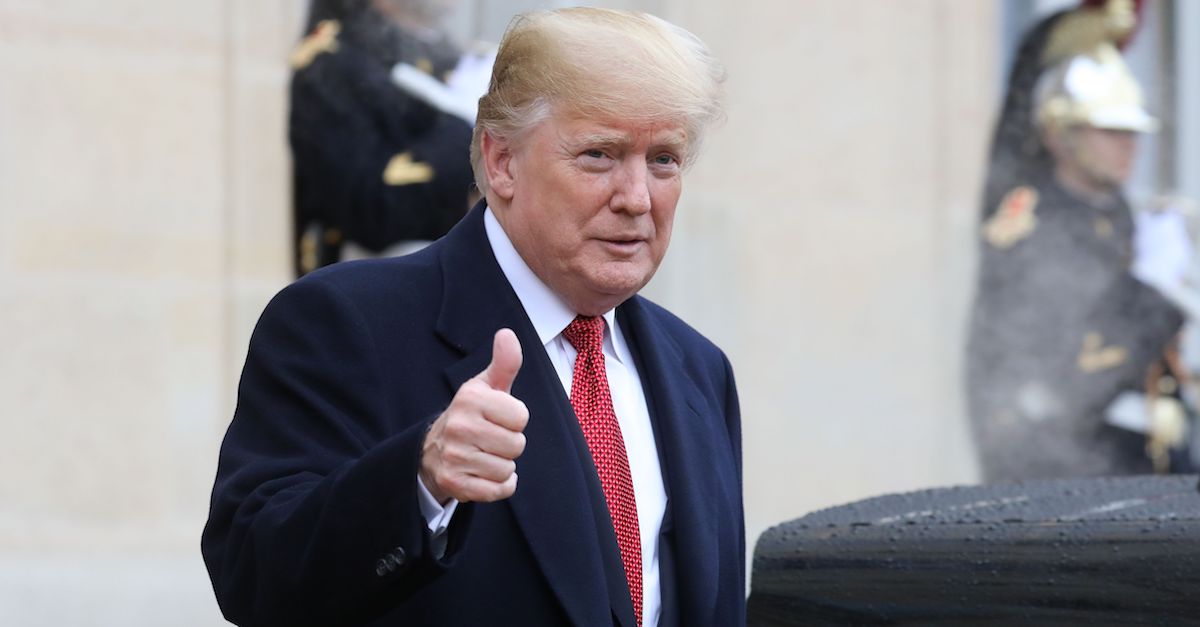
President Donald Trump may be able to have a court dismiss the impeachment charges prior to any action by the Senate. The grounds could be the judiciary’s role in determining the definition of “high crimes,” and whether the impeachment charges voted on by the House constitute “high crimes” under the Constitution. The president could seek a declaratory judgment.
Twin decisions of the Supreme Court bookmark the case law on judicial review of Congressional impeachment: Powell and Nixon. See Powell v. McCormack, 395 U.S. 486 (1969); see also Nixon v. United States, 506 U.S. 224 (1993). These cases involved the exclusion of Rep. Adam Clayton Powell Jr. from Congress and the impeachment of federal judge Walter L. Nixon respectively.
In Powell, the Supreme Court determined the judiciary had the right to determine what constituted “qualifications” for Congressional office, and the courts could reverse an action of the House if it was based on a faulty definition of qualifications for Congressional office, despite the Constitution delegating the power over Congressional qualifications to Congress itself. In Nixon, the Supreme Court determined the judiciary had no right to determine what constituted a Senate trial under the impeachment provisions of the Constitution because Congress delegated that definitional power to the Senate. The question becomes whether the courts can define what constitutes “high crimes” under the impeachment clause, or whether that definitional power is exclusively delegated to the House.
As the Supreme Court determined in Nixon (by a slim majority of the court with four concurrences divergently disagreeing): “the use of the word try in the first sentence of the Impeachment Trial Cause lacks sufficient precision to afford any judicially manageable standard of review of the Senate’s actions.” Nixon v. United States, 506 U.S. 224, 230 (1993). The court thus determined “the Senate is given unreviewable authority to interpret the Impeachment Trial Clause.” Nixon v. United States, 506 U.S. 224, 235 (1993).
In Powell, “the relevant issue in Powell was whether courts could review the House of Representatives’ conclusion that Powell was unqualified to sit as a member because he had been accused of misappropriating public funds and abusing the process of the New York courts.” Nixon v. United States, 506 U.S. 224, 236 (1993). The Court concluded that when the Constitutional terms at issue “are defined and fixed in the constitution,” then they are “unalterable by the legislature.” Powell v. McKormack, 395 U.S. 486, 539 (1969). This was despite “a textual commitment of unreviewable authority” in the Constitution that “Each House Shall be the Judge of the Elections, Returns and Qualifications its own Members.” Nixon v. United States, 506 U.S. 224, 237 (1993).
In Nixon, the Court recognized there might be a Powell exception to Congressional control over impeachment where the issue involved a “separate provision of the Constitution” that could overcome “a textual commitment of unreviewable authority” in the impeachment context. Nixon v. United States, 506 U.S. 224, 238 (1993). Four concurrences went further and even suggested any aspect of impeachment could be subject to judicial review. Nixon v. United States, 506 U.S. 224 (1993).
Much like the Congressional “qualifications” clause, the basis for impeachment includes a “separate provision of the Constitution” – the “high crimes” clause. Article II constricts the power of impeachment to “Treason, Bribery, or other high Crimes and Misdemeanors.” U.S. Constitution, Article II. As even liberal-leaning law professors like Alan Dershowitz and Jonathan Turley argue, the House impeachment for “abuse of power” is not a “high crime” analogous to “treason” or “bribery.” Many legal scholars, and Democratic Senators, agreed in 1999 when Clinton was impeached, that few crimes fit the definition of “high crimes” akin to treason. Indeed, it is undisputed that the founders expressly rejected malpractice, maladministration, and corruption as the basis for impeachment; how then could non-crimes generically entitled “abuse of power” or “obstruction” constitute a “high crime,” akin to treason itself? Even Trump critic Laurence Tribe once agreed that high crimes is such a limited term, it might not even apply to murder. The legendary Justice Benjamin Curtis ably argued before the Senate in Andrew Johnson’s trial that Congress cannot impeach someone unless the complained-of conduct was made a crime prior to the time of the complained-of act. Indeed, as other scholars concur, the principle of “no crime without law” reflects “the most widely held value judgment in the entire history of human thought.” The same principle predicates our Constitutional guarantees against bills of attainder, ex post facto punishment, and due process itself. The Constitutional constriction on impeachable offenses protects presidents of both parties. How can Trump be impeached for something that wasn’t a crime?
Under the same logic as applied in Powell, Trump could use the courts to contest whether the House has final, unreviewable authority on what constitutes a “high crime” akin to “treason.” The House has charged “abuse of power,” which is not even a crime at all, and “obstruction of Congress” for asserting executive privilege, which is equally undefined as a generic crime. Trump could seek judicial review as to whether either can Constitutionally constitute “high crimes” meriting Presidential impeachment. A novel question for the Courts, but consonant to the judicial role of defining Constitutional terms, and consistent with the logic of the Powell decision limiting Congressional control over defining specific Constitutional terms which serve as the basis for removal of an elected official without the assent of the public that voted him in. As the famed Justice Curtis explained in the infamous impeachment of Andrew Johnson: “There must be some law; otherwise there is no crime.” If no law fits, you must acquit.
Robert Barnes is a California-based trial attorney whose practice focuses on Constitutional, criminal and civil rights law. You can follow him at @Barnes_Law.
[Image via LUDOVIC MARIN/AFP/Getty Images]
This is an opinion piece. The views expressed in this article are those of just the author.